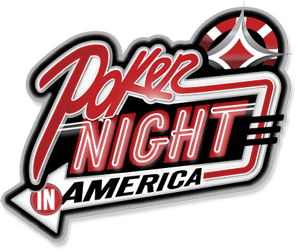
If you watch “Poker Night In America” on CBS Sports Network, you might have caught a glimpse of me on Monday night when they aired a show that was recorded during Thanksgiving weekend 2015 at the Seminole Hard Rock in Hollywood, Florida. My wife and I happened to be down there for the holiday, so when a friend who was one of the producers called, I put aside a day to go and play.
Unlike other poker TV that shows tournament action, PNIA is about cash games, where you can buy-in for any amount from $5,000 to $20,000 and rebuy anytime you like. The stakes are $25/50, so I bought in for 300 big blinds ($7,500). Of my six opponents, some started with more, some with less.
When I agreed to do the show, I assumed that the player lineup would include well-known pros who had appeared on other PNIA episodes, like Phil Hellmuth, Phil Laak, Tom Schneider, Shaun Deeb, and Gavin Smith. Unfortunately, none of them were there. Instead, I ended up with people I didn’t know — Jake Schindler, Michael Laake, Samantha Abernathy, Mike Dentale, Mike Sigel, and Joe DiPascale.
The former three were pretty quiet, but the latter three talked up a storm, particularly when they were in hands against each other — which was quite often. Meanwhile, I was positively card dead, getting very few playable hands, which was a shame because there was a lot of loose, aggressive action. Stacks were pushed around, pots got huge, and I was just an observer. If you saw the show, all you saw me do was fold 95% of the time while watching the three guys at the other end of the table go crazy.
I hoped that would change later, but I never got the chance, because after four hours, we took a dinner break and Matt Glantz (a poker pro who recruits players for PNIA) came over to tell us that because we weren’t getting involved enough, Laake, Schindler, and I were going to be replaced at the table. I started to protest, but then realized that, because they’re making a TV show, Glantz and the other producers were only interested in a loud game with plenty of loose play — the worse, the better. During that opening session, four of the players (Abernathy, Dentale, Sigel, and DiPascale) had lost all their chips at some point, but re-bought and just kept pushing.
Later, my friend who had invited me asked for a post-mortem. I told him I had no problem with the stakes, the stacks, or the lineup, but was very disappointed I didn’t get to keep playing, especially when Jennifer Tilly joined the table after dinner. I also predicted that the production wouldn’t use any of the few hands that I did play because they weren’t exciting enough for TV.
Although I did end up winning a bit, my prediction came true. So, I chalk it up as an interesting experience and nothing more.
